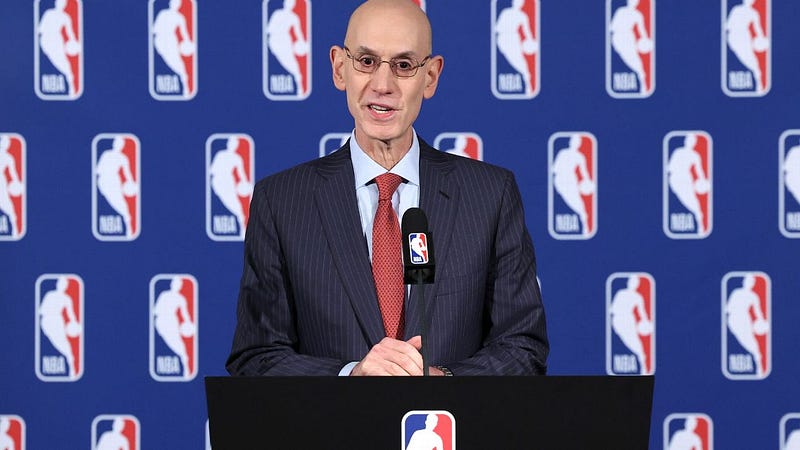
This offseason, NBA owners came together with the players union (NBPA) to ink a new collective bargaining agreement, which will keep the league open through the 2029–2030 season. NBA commissioner Adam Silver sought to cure an epidemic plaguing the modern NBA: the tendency of star players to sit out games to heal from or prevent injuries. The league argues that “load management,” particularly in nationally televised games, hurts the standing of the sport with fans and league partners. Opponents feel that rest is simply a symptom of an overlong NBA season that has become increasingly taxing as the pace of play has increased in recent years. With nine-figure contracts being handed out, often to players over the age of 30, it makes sense for players to “pick their spots.”
This summer, Adam Silver set out the rules. At least one star (defined as having made an All-Star or all-NBA team in the past three years) must suit up and play. Star players must be made available for National TV and in-season tournament games. A player must appear in at least 65 games for 20 minutes to be eligible for All-NBA teams and end of season awards (and a supermax contract thereby). Additionally, while team physicians still decide if a player is healthy enough to play, the league holds the right to investigate a player’s state via independent medical personnel.
All in all, although a bit complex, the new policy should ensure that we have more big players playing in big games. With a new media rights deal on the way, the NBA wants to do everything it can to spruce up its product. Will this work? Probably not.
The problem is that the new policy has created a space where there is some rest that is worse than others. There is “bad rest” that is punished and “good rest” that is not. Reigning MVP Joel Embiid nearly sat out the Philadelphia 76ers’ home debut this past Sunday and he’s not alone. Devin Booker, Bradley Beal and Jimmy Butler all sat out games in the opening week after playing in the preseason that same month. They were able to do so because of exceptions built into the rules. Phoenix Suns forward Kevin Durant played, leaving Beal and Booker off the hook. Miami’s Bam Adebayo played, allowing Butler to sit out in Minnesota.
The policy takes aim at surface-level concerns (lost TV ratings and broadcaster relations) rather than the root cause of the issue: there is an injury crisis in the NBA. Players come into the league younger, with grueling Amateur Athletic Union schedules at the youth level. For American players, at least, it leaves many already broken physically before stepping on an NBA floor. With fewer years of college experience, players are more frail and less capable of withstanding the physical nature of NBA play.
Players are making more money than ever, so it makes sense to manage a player’s rest to avoid the kinds of devastating injuries that can cost a player a season or more. Take Jamal Murray. After tearing his ACL in April 2021, Murray missed the rest of that season and all of the next one. While Murray did help the Nuggets to a first championship his first season back in 2022–2023, his team effectively lost two years of contention with its star guard absent. Additionally, because of Murray’s contract, the Nuggets had spent over $30 million for Murray to wear street clothes.
Keep in mind, this is the best outcome. Denver got their ring. The LA Clippers have spent far more on forward Kawhi Leonard to not play and still hold an empty trophy cabinet. It is these kinds of risks that make rest such a popular option. So if the new policy is doomed to fail, why did Silver take such a small step?
Since becoming NBA Commissioner in 2014, Silver has prided himself as a partner with the NBPA. He has shied away from the controversial, almost dictatorial reign of NFL Commissioner Roger Goodell. Silver led the ouster of racist former Clippers owner Donald Sterling, allowed players to freely use marijuana and instituted a court that featured the Black Lives Matter message during the 2020 bubble. This partnership has allowed Silver to preside over 15 years of labor peace since becoming commissioner once the current CBA expires. In a league that has gone through a pandemic, economic uncertainty and the most powerful players of any sport, that is quite a feat.
At the end of the day, Silver is still the NBA’s boss. Severe fines, stripping of draft picks, shortening the season and reducing the number of playoff spots could all potentially solve this problem. The problem is that each would put Silver in hot water with broadcasters, sponsors, players, owners, or other key stakeholders. These moves would be unpopular but might just be more needed than ever. Roger Goodell has never cared about his own popularity and it has enabled him to steer the NFL through some pretty dark waters. So long as Silver refuses to do something controversial, this will continue to plague the NBA.
















